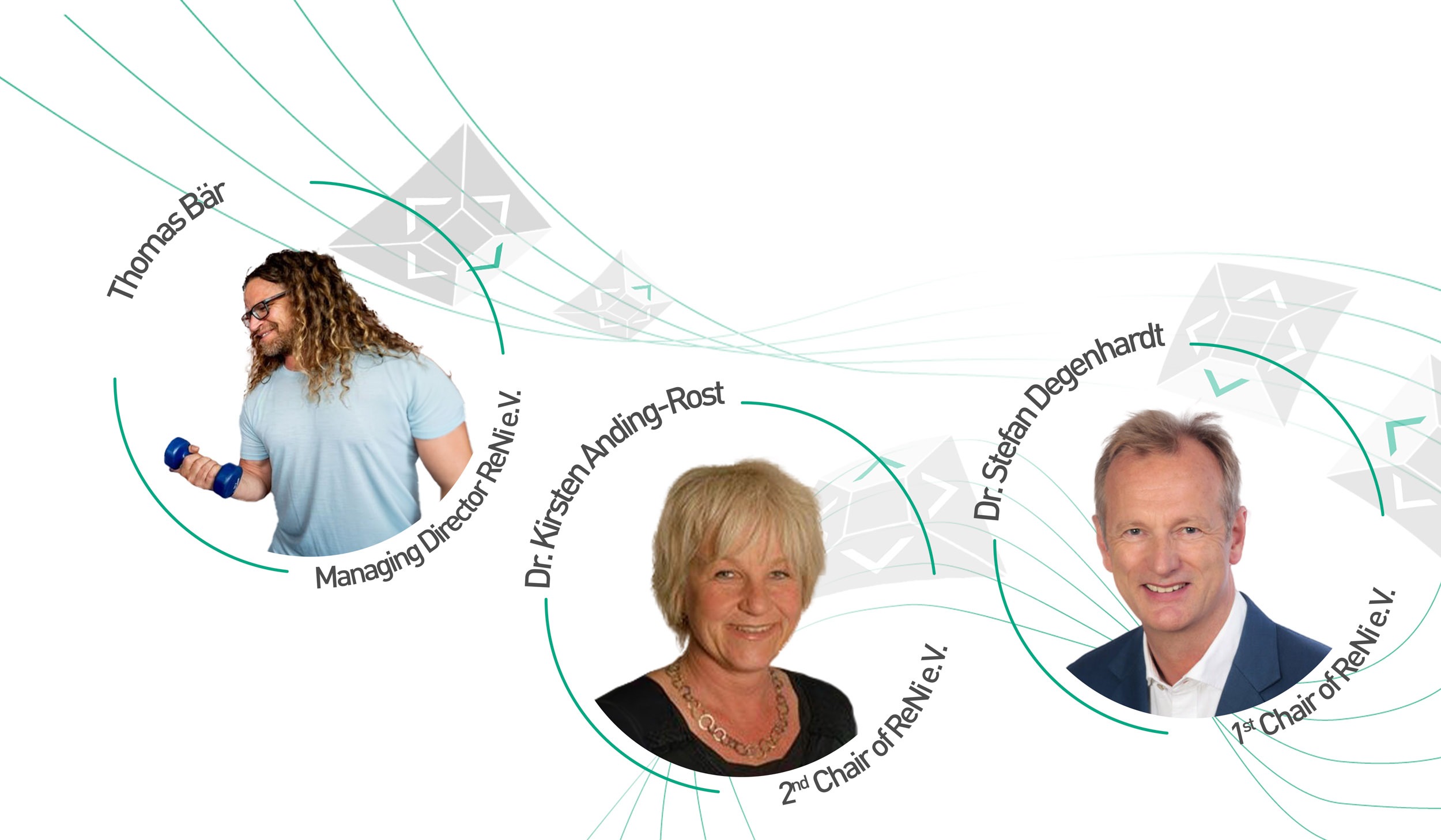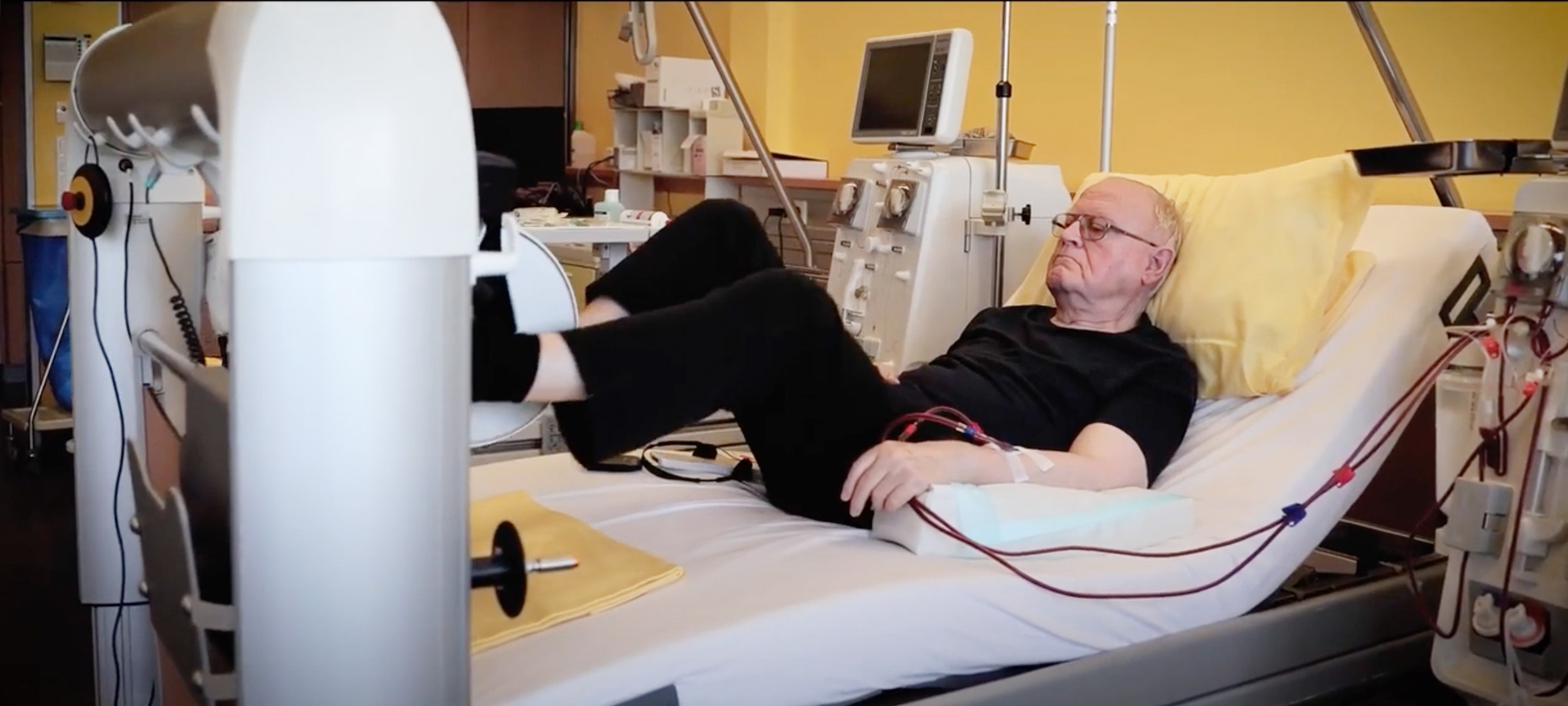
THERAPY-Magazin
Webinar: Exercise therapy during dialysis
Discover how structured training during haemodialysis improves health and quality of life. Watch the THERA-Trainer & ReNi e.V. webinar on-demand for practical tips and groundbreaking study results.

Jakob Tiebel
Health Business Consultant
Joint online event provides insights into groundbreaking findings
Exercise during dialysis means more than just physical activity – it promotes patients’ enjoyment of life and sense of community.
A webinar held in December, organised by THERA-Trainer in cooperation with ReNi Deutsche Gesellschaft Rehabilitationssport für chronisch Nierenkranke e.V., takes a fascinating look at the integration of exercise therapy into the treatment of dialysis patients. The event not only provided practical insights, but also presented important study results that illustrate the positive effect of training during haemodialysis.
Background
The ReNi e.V. expert panel, consisting of Stefan Degenhardt (1st Chair), Kirsten Anding-Rost (2nd Chair) and Thomas Bär (Managing Director), gave insightful presentations during the webinar. Stefan Degenhardt emphasised the importance of exercise and sport during haemodialysis, before handing over to Kirsten Anding-Rost, who presented the results of the DiATT study.
The ReNi e.V. expert panel, consisting of Stefan Degenhardt (1st Chair), Kirsten Anding-Rost (2nd Chair) and Thomas Bär (Managing Director), gave insightful presentations during the webinar. Stefan Degenhardt emphasised the importance of exercise and sport during haemodialysis, before handing over to Kirsten Anding-Rost, who presented the results of the DiATT study.
The DiATT study shows: Structured training during haemodialysis leads to lasting improvements in the patient’s state of health.
DiATT study: a milestone in dialysis research
The Dialysis Training Therapy Study (DiATT) is a pioneering study in which around 1,000 patients from 21 German dialysis centres took part. The results, published in the New England Journal of Medicine – Evidence, show a clear improvement in the health of the participants after one year of structured training, despite the difficult conditions caused by the COVID-19 pandemic.
The Dialysis Training Therapy Study (DiATT) is a pioneering study in which around 1,000 patients from 21 German dialysis centres took part. The results, published in the New England Journal of Medicine – Evidence, show a clear improvement in the health of the participants after one year of structured training, despite the difficult conditions caused by the COVID-19 pandemic.
Practical implementation and training sessions
In his presentation, Thomas Bär, an expert in dialysis training therapy, talked about the practical implementation of this therapy. He emphasised the importance of a long-term training structure, divided into adaptation, build-up and stabilisation phases. He structured the training sessions themselves into warm-up, main and wind-down phases, with the selection of exercises being individually adapted to the needs of the patients.
In his presentation, Thomas Bär, an expert in dialysis training therapy, talked about the practical implementation of this therapy. He emphasised the importance of a long-term training structure, divided into adaptation, build-up and stabilisation phases. He structured the training sessions themselves into warm-up, main and wind-down phases, with the selection of exercises being individually adapted to the needs of the patients.

Training during dialysis: FAQs
Following the presentations, the panel of experts answered numerous questions from the audience. Topics such as the optimal time for training, the dosage of exercise, options for increasing the intensity and medical requirements were discussed in detail. The topic of financing was also addressed.
Following the presentations, the panel of experts answered numerous questions from the audience. Topics such as the optimal time for training, the dosage of exercise, options for increasing the intensity and medical requirements were discussed in detail. The topic of financing was also addressed.
On-demand access to the webinar
For those who missed the live event, the webinar is now available as an on-demand video. The recording provides a comprehensive insight into the information presented and the interactive discussion that took place during the webinar.
For those who missed the live event, the webinar is now available as an on-demand video. The recording provides a comprehensive insight into the information presented and the interactive discussion that took place during the webinar.
The webinar not only provides insights into clinical practice, but also encourages clinicians to start exercise therapy with dialysis patients immediately – having the courage to get started is key.
Conclusion and outlook
The conclusion of the webinar emphasises the challenges but also the rewards of exercise therapy for dialysis patients. Creating active and satisfied patients who can do something for their own health lifts their spirits and promotes community. Despite the difficulties in organising such programmes on a permanent basis, it is encouraged to start immediately and not shy away from implementing them. The initiative to secure comprehensive reimbursement from health insurance companies highlights the commitment to expanding the establishment of such programmes and making them accessible to a broader audience. Watch the on-demand webinar to gain valuable insights and recommendations from the experts. The recording is available to anyone who would like to gain deeper insight into the world of exercise therapy for dialysis patients. Start today and be inspired by the positive effects of structured training during haemodialysis.
The conclusion of the webinar emphasises the challenges but also the rewards of exercise therapy for dialysis patients. Creating active and satisfied patients who can do something for their own health lifts their spirits and promotes community. Despite the difficulties in organising such programmes on a permanent basis, it is encouraged to start immediately and not shy away from implementing them. The initiative to secure comprehensive reimbursement from health insurance companies highlights the commitment to expanding the establishment of such programmes and making them accessible to a broader audience. Watch the on-demand webinar to gain valuable insights and recommendations from the experts. The recording is available to anyone who would like to gain deeper insight into the world of exercise therapy for dialysis patients. Start today and be inspired by the positive effects of structured training during haemodialysis.
bemo
Cycling
Dialyse Trainings-Therapie
Education
Fachkreise
Produkte
Therapy & Practice
THERAPY 2024-I
THERAPY Magazine
Webinar

Jakob Tiebel
Health Business Consultant
Jakob Tiebel is OT and studied applied psychology with a focus on health economics. He has clinical expertise from his previous therapeutic work in neurorehabilitation. He conducts research and publishes on the theory-practice transfer in neurorehabilitation and is the owner of an agency for digital health marketing.

Fabian Scheffold
Project Manager New Business Development, THERA-Trainer
Fabian Scheffold has been in
charge of dialysis exercise therapy
at THERA-Trainer for several
years as a project manager in
the New Business Development
department. Through his experience
in the project, he has built up
broad expertise and an exciting
network. Thanks to his MBA
studies, he also understands the
business challenges of dialysis
centres.
References:
Related contents
Find related exciting contents in our media library.
Mehr laden
This is not what you are searching for? Knowledge
Meet our specialists.
Are you interested in our solutions? Schedule a meeting with a Consultant to talk through your strategy and understand how TEHRA-Trainer can help you to advance rehabilitation.